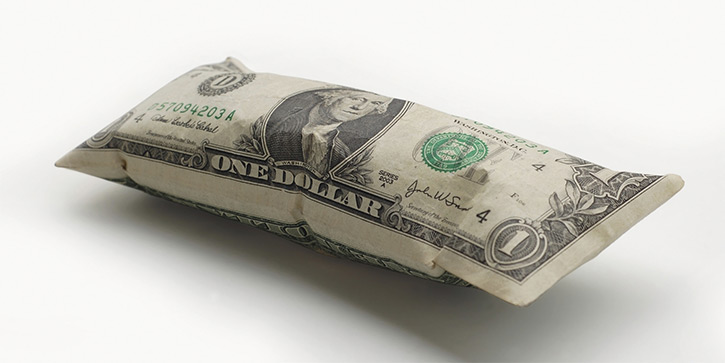
The Inflation Question
-
 Jared Dillian
Jared Dillian
- |
- July 2, 2020
- |
- Comments
Last week, I got a call on The Jared Dillian Show asking about inflation. How do you protect yourself against it?
Inflation is very disruptive. As the high inflation of the late ‘70s and early ‘80s fades into the distance, people’s memory of it has diminished. So I’ll remind you of what happens: inflation distorts all economic behavior.
For example: you go to Lowe’s to buy fertilizer. A bag of fertilizer costs $8. But inflation is running around 10%. So you buy 10 bags of fertilizer, use one, and store the other nine in your basement. Because the price will be higher later.
The act of you buying more fertilizer than you need pushes the price higher, and if everyone acts in concert, it pushes the price higher still. Maybe you become a fertilizer hoarder and sell fertilizer to your neighbors at higher prices.
Inflation speeds up an economy. It doesn’t make an economy better; it makes it faster.
It seems like everything the government does these days is designed to make the economy faster. We should instead try to think about ways to make it better.
The attractiveness of Keynesian economic philosophy is that you get short-term gain, at the expense of long-term pain. But nobody cares about the long-term pain, because in the long run, we are all dead—right?
Future generations will care about the long-term pain. But we have finally reached the point where we are the future generations.
Inflation is poorly understood. The old model paid a lot of attention to money supply growth. Today, we have lots of money supply growth—more money chasing the same amount of goods, theoretically—but no inflation.
I’m not smart enough to update Milton Friedman’s quantity theory of money. But our attempts to create inflation could undermine confidence in the dollar, which I’ve talked a little bit about here.
I’m going to attempt to tie the retail stock buying madness into this discussion of inflation. There was another time in history with lots of inflation and lots of speculation that ultimately resulted in unrest. That time was 1920’s Germany. It’s not an exact parallel—nothing is—but what we are experiencing has echoes of the Weimar republic.
Back to the Question
How do you protect yourself against inflation? There are a few ways.
The first and most obvious is gold—an objective store of value. Gold isn’t precisely correlated with periods of inflation, but it is correlated with loss of confidence in the currency.
The dollar has weakened a bit more in recent weeks, with perhaps a bit more to follow. Of course, most of the developed world is trying hard to debase their currencies. So trying to pick which one will go down the most is a pointless game, at least for now.
Gold is a way you can bet on them all going down at the same time.
Like what you're reading?
Get this free newsletter in your inbox every Thursday! Read our privacy policy here.
Pretty much all hard assets are a store of value. Base metals are an acceptable substitute for gold. Oil has some gearing to inflation. Just about any commodity does, even agricultural ones.
Of course, commodities have been a horror show for so long that this is a tough sell. But the fact that commodities have no cash flows makes them an asset, rather than a liability, during periods of inflation.
And finally, stocks are an imperfect hedge against inflation. I like to call stocks inflation pass-thru vehicles, as companies have the ability to pass along higher prices. As nominal earnings rise, nominal stock prices will rise.
Stock markets have performed well in countries with episodes of high inflation or hyperinflation—but ultimately did not fully keep up with inflation. Still, it’s better than nothing.
The Answer
COVID-19 is a deflationary shock. But I have a hard time believing that the fiscal and monetary stimulus that was unleashed as a result of it won’t one day cause inflation.
It should be mentioned that I am one of those people who thinks there will always be inflation. I thought that in 2008, like a lot of other people. I see inflation wherever I go.
That’s probably because I am old enough to have some memory of it, and I think we should be vigilant. The Federal Reserve, which is supposed to be vigilant about inflation and inflation expectations, is actually doing the opposite.
Interestingly enough, The Awesome Portfolio does pretty well during periods of high inflation—it has built-in inflation protection, which makes it more appropriate now than at any point in the last 30 years.
Remember—inflation doesn’t actually have to happen for inflation trades to work. All we need is the fear of inflation. Of course, nobody seems to have any fear of anything right now.
And I don’t think you ought to be afraid... but you do need to stay vigilant and prepare yourself for inflation—and for continued volatility, along with the possibility of another precipitous dive in the markets. There’s a lot to balance. Which is why I’ve streamlined all the steps you want to take with your money now in The Awesome Portfolio. Click here to get the details.

Jared Dillian
subscribers@mauldineconomics.com

 Jared Dillian
Jared Dillian